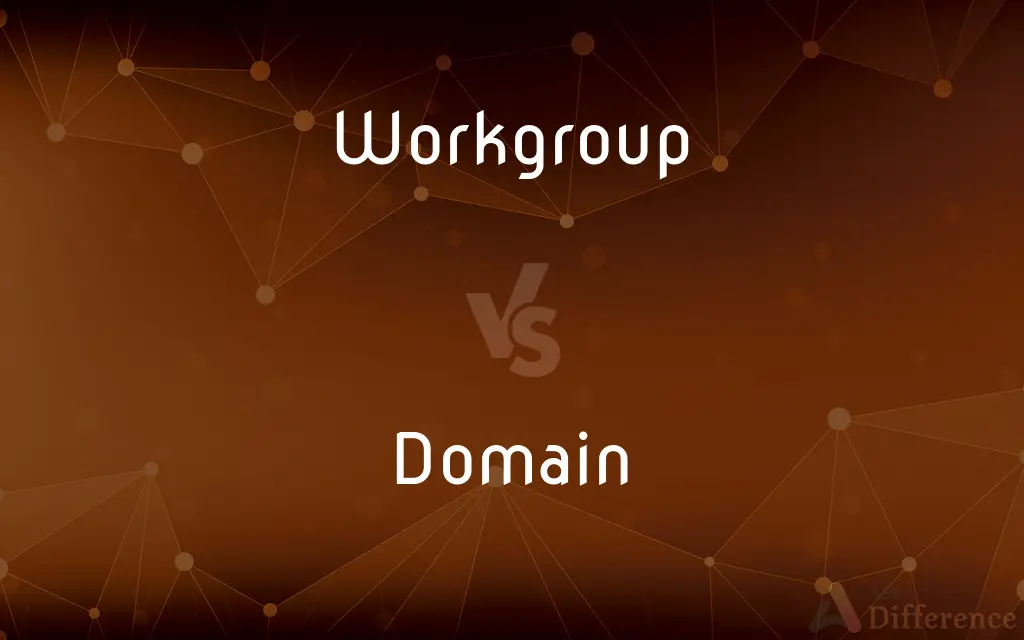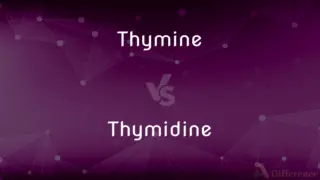Workgroup vs. Domain — What's the Difference?
By Fiza Rafique & Maham Liaqat — Updated on April 21, 2024
Workgroup is a peer-to-peer network model without centralized control, whereas a Domain involves a client-server model with centralized administration.

Difference Between Workgroup and Domain
Table of Contents
ADVERTISEMENT
Key Differences
A Workgroup is a collection of computers on a network that manage their own settings and resources independently, while in a Domain, settings and resources are centrally managed by a server known as a domain controller.
In a Workgroup, each computer operates as its own entity with local accounts, whereas a Domain allows for centralized account management, enabling users to log on to any computer within the network with the same credentials.
Workgroups are typically used in smaller networks where fewer computers and simplicity are prioritized, while Domains are suited for larger networks requiring robust management and security features.
Security in a Workgroup is managed individually on each computer, leading to potentially inconsistent security policies; on the other hand, Domains provide a unified security policy managed from the domain controller.
The setup and maintenance of a Workgroup are generally simpler and require less technical knowledge compared to the complexity and technical expertise required to manage a Domain.
ADVERTISEMENT
Comparison Chart
Network Model
Peer-to-peer
Client-server
Control
Decentralized, individual control
Centralized, administered by a server
Account Management
Local to each computer
Centralized, single login across network
Ideal Environment
Small networks, fewer PCs
Larger networks, many PCs
Security Policy Management
Managed separately on each PC
Unified, managed by domain controller
Compare with Definitions
Workgroup
A network model for small localized groups without centralized management.
In a Workgroup, each PC can set its own security policies.
Domain
Requires skilled IT personnel for setup and maintenance.
The installation of a Domain network requires knowledgeable system administrators.
Workgroup
Used mainly in home or small business settings.
The home office network is set up as a Workgroup to allow easy sharing.
Domain
A network arrangement that centralizes data and user management.
Users in a Domain can access their files on any networked computer.
Workgroup
A setup where each computer handles its own administration.
Adjusting user access in a Workgroup must be done individually on each computer.
Domain
Managed by a domain controller which handles security and user credentials.
The company’s IT department uses a domain controller to reset passwords.
Workgroup
Relies on local accounts for user management.
Each computer in a Workgroup has its own set of user accounts.
Domain
Implements a unified security policy across all networked computers.
Security updates in a Domain are pushed centrally to all connected devices.
Workgroup
Requires minimal technical knowledge for setup.
Setting up a Workgroup can be done without specialized IT skills.
Domain
Suitable for medium to large networks with many users.
Our corporation utilizes a Domain to facilitate resource management across its global offices.
Workgroup
A group of workers engaged in a series of collaborative tasks who usually work together.
Domain
An area of territory owned or controlled by a particular ruler or government
The French domains of the Plantagenets
Workgroup
(computing) A computer network created for use by such groups.
Domain
A distinct subset of the Internet with addresses sharing a common suffix or under the control of a particular organization or individual.
Domain
A discrete region of magnetism in ferromagnetic material.
Domain
The set of possible values of the independent variable or variables of a function.
Domain
A distinct region of a complex molecule or structure.
Domain
A territory over which rule or control is exercised.
Domain
A sphere of activity, influence, or knowledge
The domain of history.
Domain
The set of all possible values of an independent variable of a function.
Domain
An open connected set that contains at least one point.
Domain
(Computers)A group of networked computers that share a common communications address.
Domain
(Physics)Any of numerous contiguous regions in a ferromagnetic material in which the direction of spontaneous magnetization is uniform and different from that in neighboring regions.
Domain
(Biology)Any of three primary divisions of organisms, consisting of the eukaryotes, bacteria, and archaea, that rank above a kingdom in taxonomic systems based on similarities of DNA sequences.
Domain
(Law)The land of one with paramount title and absolute ownership.
Domain
A geographic area owned or controlled by a single person or organization.
The king ruled his domain harshly.
Domain
A field or sphere of activity, influence or expertise.
Dealing with complaints isn't really my domain: get in touch with customer services.
His domain is English history.
Domain
A group of related items, topics, or subjects.
Domain
(mathematics) The set of all possible mathematical entities (points) where a given function is defined.
Domain
The set of input (argument) values for which a function is defined.
Domain
(mathematics) A ring with no zero divisors; that is, in which no product of nonzero elements is zero.
Integral domain
Domain
An open and connected set in some topology. For example, the interval (0,1) as a subset of the real numbers.
Domain
Any DNS domain name, particularly one which has been delegated and has become representative of the delegated domain name and its subdomains.
Domain
A collection of DNS or DNS-like domain names consisting of a delegated domain name and all its subdomains.
Domain
(computing) A collection of information having to do with a domain, the computers named in the domain, and the network on which the computers named in the domain reside.
Domain
(computing) The collection of computers identified by a domain's domain names.
Domain
(physics) A small region of a magnetic material with a consistent magnetization direction.
Domain
(computing) Such a region used as a data storage element in a bubble memory.
Domain
(data processing) A form of technical metadata that represent the type of a data item, its characteristics, name, and usage.
Domain
(taxonomy) The highest rank in the classification of organisms, above kingdom; in the three-domain system, one of the taxa Bacteria, Archaea, or Eukaryota.
Domain
(biochemistry) A folded section of a protein molecule that has a discrete function; the equivalent section of a chromosome
Domain
Dominion; empire; authority.
Domain
The territory over which dominion or authority is exerted; the possessions of a sovereign or commonwealth, or the like. Also used figuratively.
The domain of authentic history.
The domain over which the poetic spirit ranges.
Domain
Landed property; estate; especially, the land about the mansion house of a lord, and in his immediate occupancy; demesne.
Domain
Ownership of land; an estate or patrimony which one has in his own right; absolute proprietorship; paramount or sovereign ownership.
Domain
The set of values which the independent variable of a function may take. Contrasted to range, which is the set of values taken by the dependent variable.
Domain
A connected set of points, also called a region.
Domain
A region within a ferromagnetic material, composed of a number of atoms whose magnetic poles are pointed in the same direction, and which may move together in a coordinated manner when disturbed, as by heating. The direction of polarity of adjacent domains may be different, but may be aligned by a strong external magnetic field.
Domain
An address within the internet computer network, which may be a single computer, a network of computers, or one of a number of accounts on a multiuser computer. The domain specifies the location (host computer) to which communications on the internet are directed. Each domain has a corresponding 32-bit number usually represented by four numbers separated by periods, as 128.32.282.56. Each domain may also have an alphabetical name, usually composed of a name plus an extension separated by a period, as worldsoul.org; the alphabetical name is referred to as a domain name.
Domain
The three-dimensional structure within an immunoglobulin which is formed by one of the homology regions of a heavy or light chain.
Domain
The field of knowledge, expertise, or interest of a person; as, he had a limited domain of discourse; I can't comment on that, it's outside my domain.
Domain
A particular environment or walk of life.
Domain
People in general; especially a distinctive group of people with some shared interest.
Domain
A particular environment or walk of life;
His social sphere is limited
It was a closed area of employment
He's out of my orbit
Domain
Territory over which rule or control is exercised;
His domain extended into Europe
He made it the law of the land
Domain
The set of values of the independent variable for which a function is defined
Domain
People in general; especially a distinctive group of people with some shared interest;
The Western world
Domain
A knowledge domain that you are interested in or are communicating about;
It was a limited domain of discourse
Here we enter the region of opinion
The realm of the occult
Common Curiosities
Which is easier to set up, a Workgroup or a Domain?
A Workgroup is generally easier to set up due to its simplicity and lack of centralized management requirements.
What are the benefits of using a Domain over a Workgroup?
The main benefits of using a Domain include centralized management, enhanced security measures, and efficiency in handling large numbers of users and computers.
What is a workgroup in computer networking?
A workgroup is a type of peer-to-peer network where each computer is responsible for its own administration and security, typically used in small networks.
What is a domain in computer networking?
A domain is a form of network that uses a client-server model where a central server, or domain controller, manages network security and user credentials.
What kind of network would benefit most from a Domain?
Large corporate networks with many users, requiring robust security and centralized management, benefit most from being organized as a Domain.
What are the limitations of a Workgroup in terms of scalability?
Workgroups are limited in scalability due to the decentralized management and lack of efficient tools to handle large numbers of users or machines.
Can a computer be part of both a Workgroup and a Domain?
Typically, a computer can only be part of either a Workgroup or a Domain, not both at the same time.
How does file sharing work in a Workgroup compared to a Domain?
In a Workgroup, file sharing is managed individually by each PC, requiring separate permissions, while in a Domain, file permissions can be centrally managed and standardized across all computers.
What is required to convert a Workgroup to a Domain?
Converting a Workgroup to a Domain requires setting up a server to act as a domain controller, configuring network settings, and migrating user accounts to the centralized server.
Can I access resources on other computers in a Workgroup as easily as in a Domain?
Accessing resources in a Workgroup might be less straightforward than in a Domain, as each computer manages its own resources and permissions separately.
How does user authentication differ between a Workgroup and a Domain?
In a Workgroup, authentication is handled locally, whereas in a Domain, authentication is managed centrally by the domain controller.
How does network security in a Domain enhance protection against threats?
Network security in a Domain is enhanced through centralized control, which allows for consistent application of security policies, updates, and monitoring across all networked computers.
Are Workgroups suitable for businesses?
Workgroups can be suitable for small businesses with few computers and minimal security concerns.
What role does a domain controller play in a Domain network?
A domain controller manages user login credentials, enforces security policies, and facilitates resource access across the network.
How do administrative responsibilities differ in a Workgroup and a Domain?
In a Workgroup, each user is typically their own administrator, handling local security and settings, while in a Domain, these responsibilities are centralized and managed by network administrators.
Share Your Discovery

Previous Comparison
Amess vs. Mess
Next Comparison
Thymine vs. ThymidineAuthor Spotlight
Written by
Fiza RafiqueFiza Rafique is a skilled content writer at AskDifference.com, where she meticulously refines and enhances written pieces. Drawing from her vast editorial expertise, Fiza ensures clarity, accuracy, and precision in every article. Passionate about language, she continually seeks to elevate the quality of content for readers worldwide.
Co-written by
Maham Liaqat













































